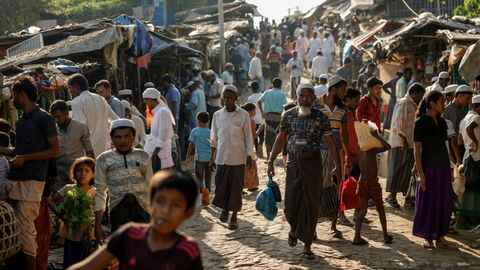In the southeast Cox’s Bazar district of Bangladesh, there are more than 1.2 million Rohingya, the majority of whom escaped Myanmar’s 2017 military crackdown.
According to a Bangladeshi official on Sunday, an additional 60,000 Rohingya have entered Bangladesh in the past two months amid the worsening fighting between the Arakan Army rebels and the junta government in Myanmar.
In Bangladesh’s Cox’s Bazar district in the southeast, there are more over 1.2 million Rohingya. Due to a military crackdown in August 2017, the majority of Rohingya left Myanmar.
Corruption along the Bangladesh-Myanmar border has also made it easier for the Rohingya to infiltrate, since some individuals assist the Rohingya in crossing the border in return for cash.
Foreign affairs adviser Md. Touhid Hossain informed reporters about his trip to Bangkok, where six nations—including Bangladesh, Laos, Thailand, India, China, and Myanmar—met informally on Thursday for a consultation.
“In theory, we oppose allowing any more Rohingya to enter. But occasionally, things get to the point where we are left with nothing else to do. Under such circumstances, we permitted 60,000 Rohingya to enter. “They entered through different routes, so it’s not that we officially let them in,” Hossain clarified in Dhaka.
Actors that are not states
He did, however, express his belief that there will not be another Rohingya wave of influx. “But we have to make arrangements to stop that wave, along with the international community,” he stated.
Last Thursday, Thai Foreign Minister Maris Sangiampongsa presided over the meeting. U Than Swe, the foreign minister and deputy prime minister of Myanmar, attended the conference as well.
“All of the countries in the meeting asked Myanmar to resolve its internal problems through talks with all parties,” Hossain continued, adding that “neighboring countries do not see any possibility of Myanmar returning to its previous state.”
Along the Bangladeshi border, the Arakan Army seizes additional territory in Rakhine state. Formal negotiations with individuals who currently control additional sections of Myanmar along the Bangladeshi border are impossible, according to Hossain.
“I told him (Than Swe) that the Myanmar border is not under your control,” Hossain stated, referring to the encounter with Swe. Non-state actors now have authority over the border. We cannot interfere with non-state actors as a state. Therefore, the Myanmar government must determine how to address the Rohingya and border issues.






